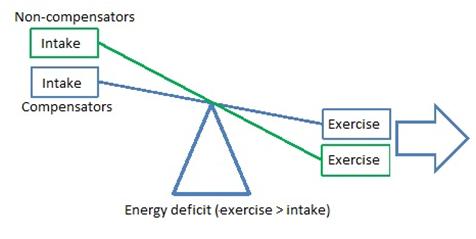
The big question : Does exercise increase or reduce hunger? Since you started training, did you notice changes in your appetite in general?
According to some researchers, there are two categories of people: compensators and non-compensators (1-3). Find out which category you belong to, and the solutions that will help you better control your appetite and your weight.
The compensators
The “compensators” are the ones who have less success in weight loss. They have a tendency to be hungrier. It is said that they compensate for the energy they spend in training by eating more calories and/or spending less energy during other parts of the day (see the diagram below). An increase in hunger could be the cause, but most likely, psychological factors and personality traits have a bigger impact. Indeed, treating oneself with food, having less control over what one eats, and eating spontaneously are behaviors most frequently observed in “compensators”. So, how can we avoid being tricked by our body or personality traits?
- Enjoy training. Eating is a source of pleasure, but training should be as well. By experiencing pleasure while exercising, the body will not need to fulfill this need as much, and therefore will not need food treats.
- Prevent excess. A greater appetite can often be explained by a nutrition that is not optimal on training days. After exercising, it is essential to have a snack to restore energy reserves and promote recovery. Otherwise, we risk yielding to excess during the rest of the day. The article Is Your Appetite Playing Tricks On You? will provide tips to avoid this.
- Choose the right foods. They should be filling, and contain fiber and/or proteins while providing the minimum amount of calories: legumes, vegetables, fruit, low-fat yogurt, whole grains, lean meat and poultry, etc. For more information, see Top 10 Foods That Will Help You Lose Weight.
Non-compensators
Weight loss lasts longer in people who are said to be “non-compensators”. Their appetite does not increase as much, and could even be reduced. They might also have better control over their food intake, for example by avoiding unscheduled eating, or by leaving food on their plate when they are not hungry anymore. They are also less likely to indulge in emotional eating. So, what should a “non-compensator” do?
- Listen to their body? Exercise does not seem to disrupt their appetite. So, by eating according to their appetite, they run less risk of excess caloric intake, as long as they make healthy and balanced nutritional choices.
- Have a post-workout snack. For some people, a temporary decrease in appetite can happen after exercising. However, it is important to take a post-workout snack after exercising in order to promote recovery, rebuild energy reserves and prevent excesses for the rest of the day.
Diagram of energy balance in compensators and non-compensators:

Compensators :
– Moderate weight loss. Less difference between intake and exercise (compensation : ↑ intake or ↓ exercise).
Non-compensators :
– Greater weight loss. Greater difference between intake and exercise (no compensation). For them, exercice reduce hunger more than for the compensators.
———————————————————
REFERENCES :
- 1. King NA et al. (2012). Exercise, appetite and weight management: understanding the compensatory responses in eating behaviour and how they contribute to variability in exercise-induced weight loss. Br J Sports Med. 46(5):315-22.
- 2. Caudwell P et al. (2011). The influence of physical activity on appetite control: an experimental system to understand the relationship between exercise-induced energy expenditure and energy intake. Proc Nutr Soc. 70(2):171-80.
- 3. Hopkins M et al. (2010). Acute and long-term effects of exercise on appetite control: is there any benefit for weight control? Curr Opin Clin Nutr Metab Care. 13(6):635-40.
- 4. Tremblay, A (2010. Prenez le contrôle de votre appétit…et de votre poids. Éditions de l’Homme.
Does Exercise Increase or Reduce Hunger? is a post from Nautilus Plus. The Nautilus Plus blog aims to help people in their journey to fitness through articles on training, nutrition, motivation, exercise and healthy recipes.
Copyright © Nautilus Plus 2012

A session with a nutritionist will help you on your way!

Let's establish your nutritional goals together and get some expert advice!
Discover our nutrition services
